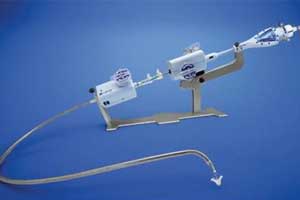- Home
- Editorial
- News
- Practice Guidelines
- Anesthesiology Guidelines
- Cancer Guidelines
- Cardiac Sciences Guidelines
- Critical Care Guidelines
- Dentistry Guidelines
- Dermatology Guidelines
- Diabetes and Endo Guidelines
- Diagnostics Guidelines
- ENT Guidelines
- Featured Practice Guidelines
- Gastroenterology Guidelines
- Geriatrics Guidelines
- Medicine Guidelines
- Nephrology Guidelines
- Neurosciences Guidelines
- Obs and Gynae Guidelines
- Ophthalmology Guidelines
- Orthopaedics Guidelines
- Paediatrics Guidelines
- Psychiatry Guidelines
- Pulmonology Guidelines
- Radiology Guidelines
- Surgery Guidelines
- Urology Guidelines
MitraClip -Next generation system for non surgical repair of mitral valve

The U.S. Food and Drug Administration (FDA) has given approval to Abbott's third generation of the MitraClip system for transcatheter-based mitral valve repair which repairs a leaky mitral valve without open-heart surgery.
The transcatheter clip-based therapy, now on a third generation of product innovations, has been used to treat more than 65,000 patients worldwide over the last ten years.
"The next-generation MitraClip system provides cardiologists with advanced steering, navigation, and positioning capabilities for the clip, making it easier to use in difficult anatomies. The enhanced system is designed to allow for more precise placement during deployment, resulting in more predictable procedures, and additionally offers a second clip size with longer arms that expand the reach of the clip-based device. The additional clip size is designed to help doctors treat patients who have more complex anatomies when repairing the mitral valve," the company writes.
Abbott received CE Mark for the next-generation device earlier this year, allowing for the sale of the devices in the European Union and other countries that recognize this regulatory designation.
"Physicians rely on MitraClip as an alternative to surgery for patients who aren't surgical candidates and may need treatment to relieve their symptoms or to survive,"Francesco Maisano, Prof., UniversitätsSpital Zürich, Switzerland, said in Abbott's press release. "The enhanced MitraClip design allows for even more precise navigation, accuracy, and stability during valve repairs, which may be important when treating people with more complex or advanced valve disease."
Mitral regurgitation (MR), a leaking mitral valve, is a serious, progressive heart disease in which the flaps of the mitral valve do not close properly, allowing blood to flow backward into the heart. MR incidence increases with age, with nearly one in 10 people over the age of 75 being affected by the disease. Before MitraClip, people who were not eligible for the standard-of-care surgery to treat their MR could only manage their symptoms with medications that don't stop the progression of the disease. If left untreated, MR leads to a variety of life-altering symptoms and severe complications, and may ultimately lead to heart failure and death.
MitraClip treats people with degenerative mitral regurgitation and is a therapy that is delivered via a catheter to the heart through a blood vessel in the leg. Treatment with MitraClip provides almost immediate symptom relief and patients are released from the hospital on average after two days.
Abbott recently began enrollment in the MitraClip EXPAND clinical study, a prospective study evaluating the safety and performance of the new MitraClip system in a contemporary real-world setting. EXPAND will enroll approximately 1,000 patients in more than 50 centers across the U.S. and Europe and interim results from the study are expected later this year.

Disclaimer: This site is primarily intended for healthcare professionals. Any content/information on this website does not replace the advice of medical and/or health professionals and should not be construed as medical/diagnostic advice/endorsement or prescription. Use of this site is subject to our terms of use, privacy policy, advertisement policy. © 2020 Minerva Medical Treatment Pvt Ltd